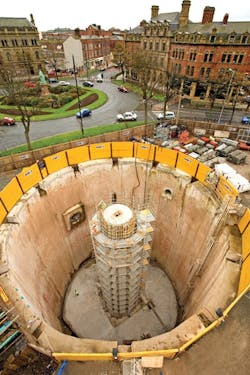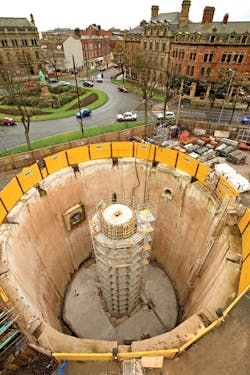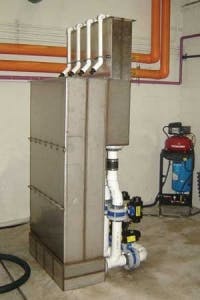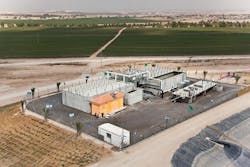Talking Water with the Kennedys
Famous for his environmental campaigning, Robert F. Kennedy Jr. is clamping down on water polluters across the US. Here he talks to Tom Freyberg on topics such as nutrient removal, controversial gas fracking and why the water sector should take him seriously.
Kennedy claims he has sued hundreds of wastewater plants in his career, many with problems related to phosphorous and struvite
Don't let Robert F. Kennedy Jr.'s soft, dulcet tones fool you. He's an articulate, vocal, informative environmentalist with water on the mind and a legal sting to his tail. Named one of Time magazine's "Heroes for the Planet" he can be credited with helping to restore the Hudson River and protecting New York City's water supply. As such he's a campaigner the global water sector should take seriously.
"In 27 years I've probably brought more lawsuits against wastewater plants than any attorney in the United States," he states proudly.
Clearly water is an issue close to his heart and one he's not using to simply win column inches worldwide.
"Water has been a focus throughout my life; I was raised on the ocean," he tells WWi magazine. "My uncle (President John F Kennedy) said our family came from the ocean and the seafaring town of Wexford, Ireland. You could say water is in my blood. My father taught us all to kayak as soon as we could hold a paddle and brought us to the great rivers of the world. My life has since been centered on rivers or waterways. I have an affinity for the subject and for most of my career it's been the focal point."
His journey from kayaking rivers of the world with his father, Robert F Kennedy, to becoming one of the most vociferous defenders of the water sector has been an interesting one.
Robert F. Kennedy Jr. warns that mineable phosphorous reserves could run out in as little as 30 years time
Having graduated from Harvard University, he studied at the London School of Economics and received his law degree from the University of Virginia Law School. Later he was awarded a Masters Degree in Environmental Law from Pace University School, where he remains a clinical professor and supervising attorney. Following a stint serving as assistant district attorney in New York City he's published the New York Times' bestseller Crimes Against Nature and The Riverkeepers.
Education to one side, if he's not filing law suits against unscrupulous polluting wastewater plants, Kennedy has his hands full representing clean energy and water companies.
He's not only the president of Waterkeeper Alliance, but also the chief prosecuting attorney for the Hudson Riverkeeper. He's also a partner in VantagePoint Capital Partners and an advisor to BrightSource Energy. And let's not forget he is on the board of directors for Canadian firm, Ostara Nutrient Recovery Technologies. So you could say he's busy campaigning for the greater good and more often than not, that good is green.
Reducing dependence on the world's phosphorous "cartel"
It is his role at the Canadian company that explains why we are here today; that and the controversial topic of phosphorous mining. It was in autumn last year when Kennedy first told me about the "worldwide phosphorous crisis" he predicted for the world. At the time he was helping to announce an agreement for Europe's first phosphorous recovery plant between Ostara and utility giant, Thames Water. He warned then that mineable phosphorous reserves could run out in as little as 30 years time.
The debate over phosphorous is one that isn't likely to go away. It's a mineral that's needed as a fertiliser in the agricultural sector to fuel rocketing food demands. Yet a high percentage runs off after rainfalls into neighbouring waterways, accelerating organic growth and causing algae blooms. At the same time liquid wastewater contains phosphorous (as humans are 1% phosphorous by weight) and other nutrients. One year down the line, has the situation improved?
"Phosphorous is as important as oil," Kennedy quips, suggesting 'no'. "Oil you can replace but it's very difficult to replace phosphorous in food production. You get the same geo-political pressures and the same economic pressures that are familiar with OPEC, where you have 12 nations controlling 70% of the oil in the world. Around three quarters of the phosphorous reserves on earth is controlled by Morocco and Western Sahara."
He describes current mining activities as 'inefficient', with 80% of applied phosphorous fertilizer running off into local waterways. The subsequent impact on drinking water supplies is where Kennedy justifiably expresses concern.
"This usually leads to algae blooms that cause all kinds of problems for waterways. It changes eco-systems; it alters them dramatically and alters water temperature. It produces all kinds of aflatoxins that are poisonous and affect the taste of the water, if you are looking at drinking water supply. But when combined with chlorine it produces a class of chemicals called trihalomethanes, which are carcinogenic. The more algae you have in there, you can have dramatic impacts on public health. In the United States somewhere over 60% of freshwater is threatened by algae blooms caused by phosphorous."
Nutrient recovery from wastewater
The impact of struvite scale build up is a serious issue. At wastewater treatment plants it can cause operation and maintenance challenges. Pumping inefficiencies and reduced system capacity to name two. As an example of an average annual cost of ridding this nuisance, Thames Water claims it was spending up to £200,000 a year in chemical dosing to remove struvite.
"I've sued hundreds of sewage treatment plants over the past 27 years and at least half of those had problems with phosphorous and struvite. They're very, very expensive problems to solve."
Since Kennedy joined Ostara's board of directors back in February 2009 he has been actively helping the firm to expand outside the US. Four nutrient recovery plants are already operating in the US, with one more planned for the region and a first to launch in Canada this spring. The Thames facility in Slough is expected to be operational by the summer of 2012 and the firm is looking to announce its second facility in Europe shortly.
Clearly struvite build-up can be costly to facility managers and it makes financial sense to invest in a solution that reduces this cost, not to mention the burden of operation downtime? If only it was that easy. So why is the international uptake of worldwide phosphorous recycling so slow?
"The answer, which I've found out through a long history of dealing with sewage treatment plants, is that the people operating these plants are engineers and they are extremely conservative," he explains. "And there's inertia about the application of new technologies. They tend to be more frightened about downside risks than they are excited about upside gains."
Hands on: the US environmentalist handling the slow release pellet fertiliser produced from the Ostara process. However, he says a current "inertia about the application of new technologies" means municipalities are not rushing to adopt phosphorous treatment technology
He adds: "Across Europe and the US operators are dealing with giant facilities which cost, in some cases, billions of dollars to construct and millions of dollars annually to operate. I think there's an aversion to risk and that is one of the barriers to adaptation of the technologies."
Discussing the different cultures experienced when spreading the nutrient recovery word on his journeys across Europe, Kennedy says the same aversion to risk is present on both sides of the Atlantic.
"What struck me is that engineers are a single breed across many cultures. When I talk to Europeans I find there is a tremendous amount of excitement among them, but I also think that they're facing the same kind of barriers that we face in the United States…plant operators also have their own little battles to fight, such as getting money from politicians for pilot projects. There's also the challenge of staff being used to doing things at their own pace and if they've worked at a plant for 30-40 years, they might not want to do something different."
Kennedy says that in the US over 60% of freshwater is threatened by algae blooms caused by phosphorous
Cracking down on fracking: water treatment problems
Phosphorous mining, pollution and treatment to one side, the US environmentalist also holds strong opinions on the ever-controversial process of hydraulic fracturing, known as fracking in the US.
The process involves injecting high pressured water underground to break apart gas-bearing rock but has been contentiously linked to triggering mini-earthquakes. The UK's first adoption of the process reportedly caused a 1.5 magnitude tremor in the region.
A regular writer on the topic, Kennedy could be called an early optimist but later turned campaigner.
Back in 2009 he wrote an article for 'The Financial Times' touting natural gas supplies as a fuel that could relieve the country of its "deadly addiction to Appalachian coal". He cited geologist predictions that new methods of fracturing could generate between 2000-5000 trillion cubic feet of natural gas – enough to power the country for a century. Two years have passed you could say his opinion has changed.
"The industry has a credibility problem. They [the hydraulic fracturing companies] have been able to capture the agencies that are supposed to regulate them and prevent the kind of strong rigorous regulation you need to make the industry work and give the industry credibility in the mind of the public…There are a number of companies out there that are behaving responsibly, but they are being hurt by a large number of bad apples."
It is the treatment of wastewater generated from fracking and its disposal that really gets Kennedy fired up. In one 'Huffington Post' article he praised investigative reports released by 'The Times' that include pages obtained through leaks and/or public records requests. He cited revelations such as sewage treatment plants in the Marcellus region accepting millions of gallons of natural gas industry wastewater. They were reported to carry significant levels of radioactive elements and other pollutants.
"Fracking water should not be going into wastewater treatment plants," he states firmly. "Sewage treatment plants are not designed for this. What we are finding now is that fracking [wastewater] not only has all of these organic chemical compounds but some of the shale beds, particularly the Marcellus Shale, are radioactive. And wastewater treatment plants are not designed to remove this level of radioactivity. So you are asking sewage plants to do something that they were not designed to do."
With regard to potential technological solutions, he adds: "There are lots of good technologies out there – desalination, filtration – where the fracking industry can decontaminate their water onsite and use closed loop systems. The problem is that US regulators at the state level have been captured by the industry and they have not been requiring them to be using best available technologies."
Water-Energy nexus
Clearly Kennedy is pro renewable energy. Keen to separate this from his relationship with BrightSource, he says: "Coal is so destructive. Nuclear is hideously expensive. And there's no need to justify it in a free market capitalist system. Planners and environmentalists are asking: do we really want to build gas plants and commit ourselves to those carbon inputs for 50 years when the price of solar is dropping so fast?"
The strong minded environmentalist practises what he preaches; a lesson many politicians could take on board. His home in New York uses geothermal energy and has two solar systems on the roof, producing more energy than needed.
Addressing continued threats of a global water shortage, he continues: "We're in the middle of a huge revolutionary disruption right now in the energy sector and that is going to have the biggest cost on water. Because everything you do with water, whether it's pumping it, or desalinating it, or cleaning it and forcing it through a filter, it's all about energy. And as the energy revolution progresses it's going to begin to affect the way we use and view water."
He cites the issue of excess energy as one answer and says in North Carolina, for example, you can get a kilowatt hour effectively free, setting aside the environmental and health externalities, all night long, as power plants have to produce energy to avoid getting shut down. Desalinating water using that excess energy in the grid is one way of solving water problems, he says.
Final message
Despite speaking eloquently for over an hour, on challenging topics such fracking, phosphorous and energy, it is clear Robert F. Kennedy Jr. could carry on for some considerable time. Unlike other environmentalists who occasionally get their hands wet with the water sector, Kennedy is fully engaged with industry's current challenges.
When asked if there's a final message he would like to send out to the water and wastewater industry, he returns to the concept of innovation, or lack of. "I don't think people should take risks with public health, but I think so many opportunities are being lost because of conservatism within the water treatment community," he says.
Whether or not his message will really be able to galvanise historically slow innovation habits, however, is another question. But with hundreds of wastewater treatment plants successfully sued as a track record, he's definitely a man worth listening to. WWi
Author's note: Tom Freyberg is the chief editor of Water & Wastewater International magazine. Email: tom@ pennwell.com
More Water & WasteWater International Current Issue Articles
More Water & WasteWater International Archives Issue Articles



